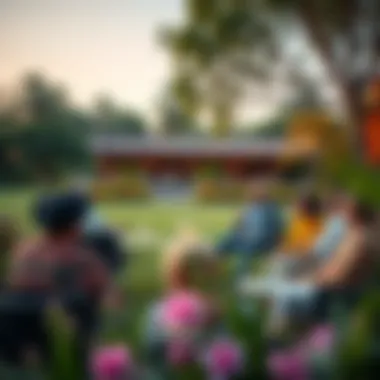Creative National Day Ideas to Celebrate Heritage


Intro
Celebrating one's national heritage is like weaving a tapestry, rich in colors of tradition, culture, and shared history. Every country has its own unique way of marking National Day, often infused with deep meanings and emotional connections. This guide explores innovative approaches to these festivities, focusing on both the established norms and the modern twists that can enhance communal involvement and cultural expression. By understanding and exploring these creative ideas, individuals can find fresh ways to celebrate, reflect, and engage with their national identity.
Market Trends and Analysis
Current Market Conditions
In recent years, there has been a noticeable shift in how National Days are observed. Traditional parades and flag ceremonies are still prominent, but the incorporation of community-focused activities is increasingly prevalent. People are seeking experiences that foster a connection not only to their heritage but also with those around them. Events that prioritize local businesses and engage in environmentally conscious practices are gaining traction.
- Emerging Themes: Activities blending cultural heritage with sustainability, local art showcases, and food festivals celebrating indigenous cuisines are some of the trends shaping the current landscape.
- Technology's Role: The rise of social media has made it easier for individuals and communities to organize events, share experiences, and promote local artists, leading to more dynamic and interactive celebrations.
Future Predictions and Growth Areas
Looking ahead, the importance of digitally integrated celebrations is becoming clearer. With online platforms widening participation, activities such as virtual workshops, cultural exchanges, and online exhibitions are likely to flourish. This opens the door for reaching wider audiences, including expatriates wanting to connect with their homeland.
- Inclusive Workshops: Consider organizing events that unite diverse community members, showcasing different cultural expressions, rather than focusing solely on a single narrative.
- Environmental Focus: Activities like community clean-ups that coincide with celebrations demonstrate a commitment to heritage that extends beyond traditional boundaries.
Innovative Celebration Ideas
Engaging Community Through Art
Art has always been a powerful medium for expression. Utilizing local artists to create murals or organize art installations can serve as both a tribute to national history and a vibrant community gathering point.
- Mural Projects: Collaborate with artists to design murals that reflect historical events or cultural identity.
- Art Fairs: Host art fairs where local creators can showcase their work, promoting both cultural heritage and new talent.
Culinary Showcases
Food is an intrinsic part of any culture. Organizing a food festival highlighting traditional dishes from different regions can be a delicious way to celebrate.
- Local Chefs: Involve local chefs to demonstrate cooking techniques and share stories behind traditional recipes.
- Pop-Up Events: Create pop-up markets where local food vendors can offer culturally significant dishes, creating a festive atmosphere.
"Heritage is not just what we inherit, it’s what we choose to honor and share with others."
Community Engagement Initiatives
Rather than relying solely on performances and official ceremonies, infuse the day's celebrations with community-driven projects that encourage participation.
- Storytelling Events: Organize sessions where community members can share personal stories related to their cultural heritage or experiences, creating a rich tapestry of shared history.
- Cultural Games: Introduce traditional games from various regions, promoting participation and friendly competition among generations.
Understanding National Day
Celebrating National Day is more than just a yearly ritual; it’s a tapestry woven with threads of history, culture, and unity. This day serves as a focal point for reflecting on the values and principles that a nation upholds. Recognizing its importance helps individuals grasp the essence of national identity, allowing for a deeper connection with the shared heritage.
Understanding National Day also provides insight into the collective memory of a country. It is a reminder of the trials and triumphs that shaped the nation’s journey. This understanding can foster patriotism, not in a superficial way, but through a genuine appreciation of a country's unique narrative. It’s crucial to delve into both the historical significance and cultural relevance to truly honor the day.
Historical Significance
The roots of National Day are often steeped in pivotal events that defined or transformed a nation. For many, it marks the anniversary of independence, unification, or some critical turning point in history. Take the United States, for instance; the Fourth of July commemorates the adoption of the Declaration of Independence in 1776. Such days are not just celebrated but studied, ensuring that future generations understand the struggles overcome by their forebears.
Reflection on past events offers people a sense of belonging. It connects individuals to their ancestors, imbuing the day with layers of meaning. Each story told and each struggle recognized strengthens communal ties and enhances shared values among the populace. This history becomes a beacon, guiding the public toward appreciating their freedoms today.
Cultural Relevance
Cultural implications of National Day resonate widely across society, as they mirror the diversity of traditions that exist within. By showcasing local customs, cuisine, and art forms, National Day celebrations can highlight the pluralism that makes a nation vibrant. In numerous countries, folk dances, traditional attire, and unique culinary experiences take center stage, engaging individuals in the richness of their collective cultural heritage.
Moreover, this day acts as a catalyst for discussions around integration and inclusivity. Acknowledging diverse cultural contributions fosters awareness and respect, crucial in a world that often emphasizes differences rather than commonalities. Understanding the cultural relevance of National Day not only enriches the celebration but also promotes harmony within the community. Once people begin to appreciate and participate in the mosaic of cultural expressions, the very essence of belonging flourishes.
"A nation's strength lies in the richness of its diverse cultures, celebrated and vibrant in their own right."
In summary, understanding National Day is about more than flags and fireworks; it is the embodiment of history and culture that unites a nation. Through a robust acknowledgment of its past significance and cultural intricacies, we open the door to a deeper, more fulfilling celebration.
Traditional Celebrations
Traditional celebrations are the heart and soul of National Day observances. They reflect the spirit of a nation, weaving together history, culture, and communities into a vibrant tapestry. Engaging in these time-honored customs honors collective memories and reinforces a sense of belonging. These celebrations serve as a lens through which citizens can witness the evolution of their cultural identity, navigating pride and history through actions and festivities.
Parades and Festivals
Parades and festivals are often the pinnacle of National Day celebrations. Picture bustling streets filled with vibrant floats, dancers in traditional attire, and local bands playing anthems that ignite a sense of unity. Such gatherings provide a stage where communities come together to express their heritage.
In many places, parades can be seen as a showcase of not only national pride but also regional diversity. Different neighborhoods may have distinct cultural flavors on display, reflecting the richness and complexity of the nation. Food stalls selling ethnic delicacies, craft booths showcasing local artisans, and children playing traditional games create an immersive experience for all ages.
Moreover, attending these events can strengthen community ties. They invite varied demographics to participate, prompting people from all walks of life to revel in what makes their nation unique. However, it is crucial for organizers to ensure accessibility so that no one feels left out. For instance, considering the needs of those with disabilities can significantly enhance participation.


Ceremonial Gatherings
Ceremonial gatherings mark poignant moments of reflection and honor. These events can include flag-raising ceremonies, speeches by local leaders, and moments of silence for those who have contributed to the nation's history. Such gatherings usually take place at significant landmarks, lending a powerful sense of place and relevance to the occasion.
These gatherings can also foster deeper understanding of a country’s past. Participants often engage in storytelling, sharing anecdotes about struggles and triumphs that have shaped the nation's identity. This exchange of stories not only honors the past but also inspires future generations to appreciate their heritage. Often, schools and community organizations can partner to facilitate these gatherings, creating an atmosphere where learning and remembrance unite.
“A nation’s strength lies in the stories it tells and the memories it preserves.”
The impact of ceremonial gatherings goes beyond mere participation; they instill a sense of duty among citizens. People leave these events with a renewed sense of commitment to their community and nation, emphasizing the importance of unity and shared responsibility.
Fireworks Displays
What’s a celebration without fireworks? Fireworks displays encapsulate the joy and exhilaration of National Day festivities. They mark the culmination of a day filled with activities, serving as a colorful punctuation mark to the events that preceded them. As the night sky bursts into a kaleidoscope of colors, families and friends gather, often sharing blankets and snacks, creating an atmosphere of camaraderie.
However, it’s vital to consider the environmental and safety aspects of fireworks. Many communities are now exploring alternatives, like drone light shows, which can reduce noise pollution and the risk of fires. Organizers should also educate attendees on safety practices to ensure a fun and hazard-free experience for everyone involved.
Beyond the fun, fireworks remind us of the sacrifices made by those who came before us. While they are a spectacle, they also serve to commemorate unity, resilience, and celebration of one's national identity. Engaging the local community in the planning stages can foster a sense of ownership and can lead to inventive displays that resonate with the history and values of the nation.
Modern Interpretations
Celebrating National Day involves more than traditional parades and fireworks; it has grown into a canvas for modern expressions that resonate with contemporary society. The shift towards modern interpretations is significant as it reflects our evolving cultural landscape. Today, people are looking for ways to celebrate that resonate significantly with their daily lives and the values of the present day. Here, we'll explore three vital components of these modern interpretations: virtual celebrations, social media campaigns, and thematic events, each playing a crucial role in how communities come together in today's digital era.
Virtual Celebrations
With the impact of technology and recent global events, virtual celebrations have gained traction. This form of celebration allows individuals and families to participate from the comfort of their homes. Not only does it include live-streaming events, but it's also an opportunity to engage with a broader audience. Think of a virtual concert showcasing local talent, streamed to an audience that spans multiple cities or even countries.
Using platforms like Zoom or YouTube allows participants to interact and share experiences in real-time. Communities can organize virtual trivia nights centered around national history or curate online storytelling sessions that highlight the rich tapestry of cultural narratives. A distinctive aspect of these virtual events is that they reduce barriers to participation, enabling everyone to engage regardless of location or ability. This approach not only celebrates national identity but builds a sense of connectedness that might otherwise be lost in distant celebrations.
Social Media Campaigns
Social media serves as a powerful vehicle for spreading awareness and encouraging community participation on National Day. By leveraging platforms such as Facebook, Twitter, and Instagram, communities can share stories, facts, and images that highlight their national pride. Campaigns that promote hashtags relevant to the day's themes can create ripple effects.
"Every tweet, post, and share can transform into a collective national narrative, echoing the sentiments of millions."
For example, a campaign might invite people to share their personal experiences or family stories related to the nation’s history, creating a rich tapestry of narratives shared across the web. Community leaders and influencers can amplify these efforts, creating buzz around local events, supporting businesses, and showcasing unique cultural practices through engaging content like videos or graphics. The result is a vibrant online community celebrating their national identity together.
Thematic Events
Thematic events offer a fresh twist on the usual celebrations, allowing creatives and organizers to blend tradition with contemporary culture. These events can center around various themes that reflect national values such as unity, diversity, or history.
Imagine a festival dedicated to showcasing the multicultural nature of a country, where different communities set up booths sharing their unique cuisines, traditional clothing, or local crafts. Such events can draw in larger crowds by adding an interactive layer, making celebrations memorable.
Additionally, incorporating workshops or demonstrations—like traditional dancing classes or cooking sessions—can engage participants actively, fostering a hands-on appreciation of one’s heritage.
In summary, modern interpretations of National Day celebrations are a mix of innovation, inclusivity, and community focus. Whether through virtual celebrations, impactful social media campaigns, or the vibrant energy of thematic events, these approaches not only honor a country’s heritage but also evolve it, ensuring relevance to today’s citizens.
Community Engagement
Community engagement during National Day celebrations plays a crucial role in fostering a sense of belonging and pride among citizens. It bridges the gap between individuals and their shared heritage, creating a platform for communal activities that resonate with collective identities. Engaging the local community enhances not only the festive spirit but also encourages mutual understanding, cooperation, and inclusiveness. By participating in communal events, people can actively contribute to the betterment of their neighborhoods while also celebrating their national identity.
Local Volunteer Projects
One of the most impactful ways to celebrate National Day is through local volunteer projects. These initiatives not only beautify neighborhoods but also serve to unite citizens under a common goal. Organizing clean-up drives in parks or along rivers, painting community centers, or planting trees can transform ordinary spaces into vibrant symbols of pride. This approach works wonders, as individuals come together, share stories, and kindle friendships while working for a good cause.
Volunteering offers both personal satisfaction and visible results. Participants often find that their contributions lead to significant changes, enhancing the community’s aesthetic and environmental quality. Websites like VolunteerMatch can help connect individuals to local opportunities, making it easier to get involved.
Neighborhood Block Parties
Neighborhood block parties bring people together in a relaxed atmosphere, allowing for connection and celebration in a more informal setting. Organizing potluck meals, where each family contributes a dish, can be a delightful way to showcase diverse culinary heritages of the community. Kids can play games, and adults can engage in lively discussions, creating a space where everyone feels included.
Such festivities often help in forging strong relationships among neighbors. Consider setting up a few activities like a community trivia quiz about national history, which not only entertains but also educates attendees. Platforms like Nextdoor can serve as a fantastic resource for planning these gatherings and sending invitations.
Cultural Exchange Workshops
Cultural exchange workshops offer a unique opportunity for participants to learn about various cultural practices within a community. These events can include cooking classes, traditional dance lessons, or art workshops that focus on different aspects of national heritage. By inviting members of different backgrounds to share their knowledge and skills, these workshops foster understanding and appreciation, making the festivities more enriching.
They also present an ideal setting to discuss essential themes such as diversity and tolerance. Each participant leaves with a broader perspective and a deeper connection to their fellow citizens. For more information about organizing such workshops, one can look at resources available on Teaching Tolerance, which provide insights and ideas to promote inclusive practices.
Engaging in community-driven projects fosters unity, enhances pride in heritage, and builds lasting connections among individuals.
Incorporating these elements of community engagement into National Day celebrations not only enriches the experience but also reinforces the fabric of society. Through local volunteer projects, neighborhood block parties, and cultural exchange workshops, individuals can honor their heritage while laying the groundwork for a thriving, connected community.
Artistic Expressions


Artistic expressions play a crucial role in celebrating National Day, serving as a vessel for culture, history, and identity. These forms of expression help communities connect deeply with their heritage, allowing individuals to interpret and showcase their national story in ways that resonate personally and collectively. Engaging in artistic activities not only cultivates creativity but also fosters unity among diverse groups, as everyone shares in the joy of contributing to something greater. When people take part in artistic endeavors, they tap into the soul of their nation—expressing values, struggles, and triumphs through various mediums.
Public Art Installations
Public art installations are a visual feast that can transform mundane spaces into poignant reminders of a nation’s history and values. They offer an immersive experience that encourages spectators to reflect on their cultural narratives. For instance, consider a mural depicting key events in a nation’s history, painted on the side of a community center. Not only does it beautify the environment, but it also sparks conversations among residents and visitors alike. These installations can vary from traditional sculptures hidden in parks to modern interactive pieces in urban settings, each piece contributing to a broader dialogue about national heritage.
- Benefits of Public Art:
- Cultural Reflection: Showcases local artists and narratives, enhancing community pride.
- Accessibility: Engages the public without barriers, making art inclusive.
- Tourism Boost: Attractive installations can draw visitors, supporting local economies.
Film and Dance Performances
Movies and dance performances breathe life into National Day celebrations by storytelling through movement and visual art. Films that reflect national struggles or joyous victories can evoke powerful emotions, allowing audiences to connect with their roots on a deeper level. Dance performances, whether traditional folk dances or contemporary pieces, celebrate the dynamism of a culture. Groups can host themed shows or festivals that invite everyone to participate, making it a shared communal experience.
"Art allows citizens to express emotions and ideas that might otherwise go unheard."
- Key Considerations in Film and Dance:
- Diversity Matters: Ensure representations from various ethnic backgrounds to reflect true national identity.
- Community Involvement: Invite local talent to showcase their skills, making the celebration authentic.
Photography Contests
Photography contests can serve as a creative outlet for individuals to capture the essence of their national identity. Encouraging participants to submit images that represent their love for their country—its landscapes, traditions, or even daily life scenes—helps create a visual tapestry that tells a much larger story. These contests not only engage the community but also foster a sense of pride in local landscapes and cultures.
- How to Organize a Successful Photography Contest:
- Set Clear Themes: Offer categories like "Tradition in Modern Life" or "Nature and the National Spirit."
- Use Social Media: Platforms like Instagram or Facebook can be used for submissions and to create buzz around the event.
- Exhibit Winning Photos: Consider hosting an exhibition where winners can display their work, solidifying the connection between art and community.
In sum, the artistic expressions of National Day symbolize much more than just celebratory activities. They hold the power to unite, educate, and inspire. Engaging in these activities promotes a rich cultural dialogue, preserving and enriching the heritage that makes a nation unique.
Sustainability in Celebrations
In an era where environmental concerns are rising to the forefront, incorporating sustainability into National Day celebrations is not just a trend—it's a responsibility. Celebrating your country's heritage through a green lens contributes positively to the community, fosters a sense of pride, and sends a strong message about the importance of environmental stewardship. The idea is to honor the past while being mindful of the future.
Eco-friendly Practices
When planning National Day activities, eco-friendly practices can take center stage. Simple changes can create a significant impact. For instance, consider using biodegradable decorations instead of plastic ones. Items made from materials like paper, bamboo, or natural fibers are excellent substitutes. They not only reduce waste but also add a touch of authenticity to the decoration.
Here are some practical suggestions for eco-friendly practices:
- Promote Carpooling: Encourage individuals to share rides to events. This reduces carbon emissions and fosters community bonding.
- Utilize Reusable Tableware: Instead of disposable plates and utensils, opt for reusable options made from sustainable materials. This change can markedly cut down on waste.
- Organize Cleanup Drives: As part of the celebrations, community members can come together for a cleanup initiative in local parks or streets. This serves dual purposes of beautifying the area and reinforcing communal solidarity.
Adopting these practices sends an encouraging message about sustainability and demonstrates a commitment to the environment, showing that you care about preserving your surroundings.
Sustainable Food Options
Food is an integral part of National Day festivities, and opting for sustainable food choices can enhance the celebration while supporting local economies. By choosing seasonal ingredients from local farmers, you reduce your carbon footprint and promote sustainable agriculture. This approach not only supports the community but also uncovers a treasure trove of flavors that might get lost when sourcing food from far-flung locations.
Here are some ways to make food options more sustainable during celebrations:
- Local Vendors: Collaborate with local farmers or artisans and feature their products at events. This keeps the money within local circles and boosts community engagement.
- Plant-Based Menus: Consider offering vegetarian or vegan dishes. These options usually require fewer resources compared to traditional meat-based meals. Dishes like roasted vegetable platters or bean salads can be delicious and satisfying.
- Promote Organic Options: Encourage attendees to choose organic foods that are grown without harmful pesticides, benefiting both health and the environment.
Ultimately, the key to sustainable food practices lies not just in the diversity of offerings but in the choice of sourcing them. When done right, food can nourish not only the body but also the spirit of community and heritage.
"Sustainability isn’t just about the earth; it’s also about the people who live on it. Celebrating responsibly helps create a future worth honoring."
Integrating Education
Education is one of those things that really primes the pump of national pride. It’s not just about history lessons or memorizing the date of a declaration. It’s a bridge to understanding the values, struggles, and triumphs that shape a nation’s identity. For National Day, integrating educational elements lends weight to the festivities, turning them into more than just a day off work, but rather a meaningful reflection on what it means to belong.
By weaving educational components into National Day celebrations, communities can foster a deep appreciation for their heritage among all age groups. This can spark dialogues that encourage families to come together through discussions about their national story. Not only that, but well-designed educational activities can combat apathy in younger generations, helping them connect with their roots.
Consider the potential ripple effects. When children are educated about their country’s history, cultures, and notable figures, they become ambassadors of that knowledge, sharing it with their peers and families. It could create a cycle of learning that enhances civic engagement and pride.
School Programs
In the arena of education, school programs can provide an excellent way to celebrate National Day while grounding students in their cultural roots. Schools could organize special assemblies or programs tailored to suit different age groups. For instance, younger students may enjoy storytelling sessions about how the national identity evolved, while high school students might engage in debates or projects analyzing contemporary national issues.
These programs can also invite local veterans or community leaders to share their firsthand experiences. Hearing stories from those who have lived through significant historical events can make the past tangible and relatable for students. Schools can use projects to emphasize collaboration; for example, classes could come together to create a mural representing national values.
Moreover, incorporating technology—like virtual tours of national landmarks—makes history accessible and engaging. But it's also essential to encourage critical thinking. Rather than just recounting history, schools could facilitate conversations around its complexities, encouraging students to form their own opinions and engage with their national identity in a nuanced manner.
Workshops on National History


Workshops focused on national history offer another crucial method to deepen the educational experience during National Day celebrations. These could be organized in collaboration with local museums, libraries, or history organizations, providing a more interactive and rich learning experience.
Such workshops can tackle specific themes or periods, allowing participants to dig into events in detail. Activities could include artifact handling sessions or genealogy workshops where individuals can trace their family histories back to pivotal moments in national history.
Additionally, consider engaging local historians or notable speakers to lead these workshops. They bring expertise and personal insights that can invigorate discussions.
Workshops can also create an inviting environment that promotes collaboration. Small group discussions allow people to share their insights and learn from one another. There could be an element where participants present findings about their family's connections to national events, transforming the narrative into a shared community history.
Engaging the community in this way underscores the importance of collective memory—it reminds everyone that national history is not just about dates and events, but the people who lived through them and contributed to their country’s story. To further dive into national history, individuals could explore resources like en.wikipedia.org or historical archives available at *.gov domains.
Integrating education into National Day celebrations adds depth and fosters a collective consciousness, turning the day into an opportunity for both reflection and discovery.
Corporate Participation
Engaging corporates in the celebration of National Day is not just about profit and branding; it's about community involvement and harnessing the company’s resources to promote national pride. When companies actively participate in their nation’s festivities, they establish themselves as integral parts of the community, enhancing their public image while fulfilling a larger social responsibility.
Corporate participation allows businesses to align themselves with the cultural and historical values that National Day represents. Embracing these celebrations can foster team spirit among employees, reflecting a sense of unity and shared purpose. Furthermore, this involvement can promote employee engagement, an often-overlooked aspect in the corporate world.
"A company’s involvement in community events can significantly uplift its brand reputation and deepen customer loyalty."
Company-sponsored Events
One of the most effective ways corporations can express support for National Day is through company-sponsored events. These events can range from local festivals to engaging family-oriented activities that highlight cultural aspects unique to the country. By planning events such as traditional food fairs, sports tournaments, or art competitions, businesses can create an enjoyable atmosphere where employees and their families connect with the community.
Key benefits of such events include:
- Enhanced Brand Visibility: Company logos on banners, promotional materials, and merchandise can lead to greater brand recognition.
- Employee Morale: Events that emphasize relaxation and fun can refresh employee spirits and improve job satisfaction.
- Community Relations: Strengthening ties with local organizations and residents can foster a positive business environment.
When organizing a corporate event, businesses ought to consider the cultural significance of the activities to ensure respect and inclusivity. It's important to make the celebration engaging for everyone involved, creating opportunities for learning and cultural exchange.
Employee Engagement Activities
On a more internal level, employee engagement activities are essential for infusing a sense of pride and belonging within a company. On National Day, companies can organize initiatives that not only celebrate the holiday but also promote team collaboration. Activities such as team-based challenges, themed potlucks, or even volunteering for community service can be quite effective.
Important considerations when planning such activities include:
- Inclusivity: Ensure that events accommodate the diverse backgrounds of employees. Engaging various cultural practices can enrich the celebration.
- Purposeful Participation: Create activities that align with the company's values and mission. This connects employees to the company's broader goals while celebrating their heritage.
- Recognition: Acknowledge contributions and participation. Giving out awards or recognitions fosters motivation and encourages future involvement.
Promoting National Identity
Promoting national identity during National Day celebrations is not merely a matter of waving flags or singing anthems. It encapsulates the essence of who a nation is, rooted in its history, culture, and shared values. This aspect of celebration serves several purposes, providing both individual and collective benefits.
When everyone rallies around a common identity, it reinforces social ties. People often feel a sense of belonging and togetherness, which can be incredibly uplifting. This is crucial in a world where globalization sometimes dilutes unique cultural identities. Through initiatives that celebrate national characteristics, communities can foster pride among citizens.
Moreover, promoting national identity can spark interest in understanding one’s heritage. Activities that delve into the history and values of a nation can lead to deeper discussions on how these elements shape contemporary society.
Symbolic Gestures
Symbolic gestures play a major role in expressing national identity during National Day. These actions often resonate more strongly than words, giving tangible meaning to feelings of patriotism. Such gestures can range from wearing national colors to participating in a moment of silence for historical events that shape a nation’s identity.
Examples of symbolic gestures include:
- Lighting a National Flame: This can symbolize hope and unity among citizens. It's a powerful visual reminder of the values that unite a nation.
- Public Sing-Alongs of the national anthem or traditional songs instill a sense of camaraderie.
- Decorating Public Spaces with flags, banners, and artwork depicting cultural icons enhances the visual representation of national pride.
These gestures often strengthen community bonds while also educating younger generations about their heritage.
Merchandise with National Branding
Merchandise featuring national branding serves not only as a way to celebrate national pride but can also be a powerful tool for promoting unity. When citizens proudly don clothes or accessories that feature unique national symbols, it sends a clear message of shared values and pride.
Consider the impact of branded merchandise:
- Apparel and Accessories: T-shirts, hats, and even jewelry showcasing national symbols like the flag or crest can serve as conversation starters, enhancing connections among individuals during celebrations.
- Home Decor: Items that celebrate national identity, like art or furniture, can cultivate a reminder of a person's roots right in their living space.
- Food and Drink Products: Nationally-branded snacks or beverages can allow people to partake in their heritage in delightful ways, from food festivals to cook-offs that explore traditional recipes.
By promoting and purchasing these products, citizens contribute to a circular economy that supports local artisans and manufacturers. This support boosts community spirit and reinforces national identity at the same time.
"When we wear our national colors or celebrate through our local foods, we keep our heritage alive, passing it from one generation to the next."
In the grand tapestry of National Day celebrations, both symbolic gestures and national branded merchandise play vital roles. These aspects are vital for unifying citizens around a shared identity, enriching personal and communal experiences alike. Each step taken towards promoting national identity not only honors the past but also paves the way for the future.
Culmination
Celebrating National Day goes beyond merely acknowledging a historical event; it's an opportunity for individuals and communities to connect with the heart and soul of their country. This article has traversed numerous avenues for fostering national pride and cultural expression. It has illustrated how celebrations can blend traditional practices with modern interpretations, allowing for a richer, more inclusive participation.
Reflections on Celebration
As we reflect on the essence of celebration, it becomes clear that these events offer vital benefits. They not only reinforce national identity but also provide a platform for diverse communities to showcase their heritage.
- Unity in Diversity: National Day invites people from various backgrounds to come together, promoting understanding and reducing societal divides. For many, it's a time to recognize the collective achievements and struggles of their ancestors.
- Cultural Transmission: Through activities like workshops or art exhibitions, younger generations gain insights into their history, creating a sense of belonging and continuity. These artistic expressions also serve as educational tools, raising awareness about cultural significance.
- Community Engagement: Events that encourage local volunteering or neighborly gatherings foster stronger bonds among residents. This communal spirit not only celebrates national pride but also cultivates a sense of responsibility towards one another. It's like knitting a tapestry where each thread represents a different story, yet all contribute to a unified whole.











